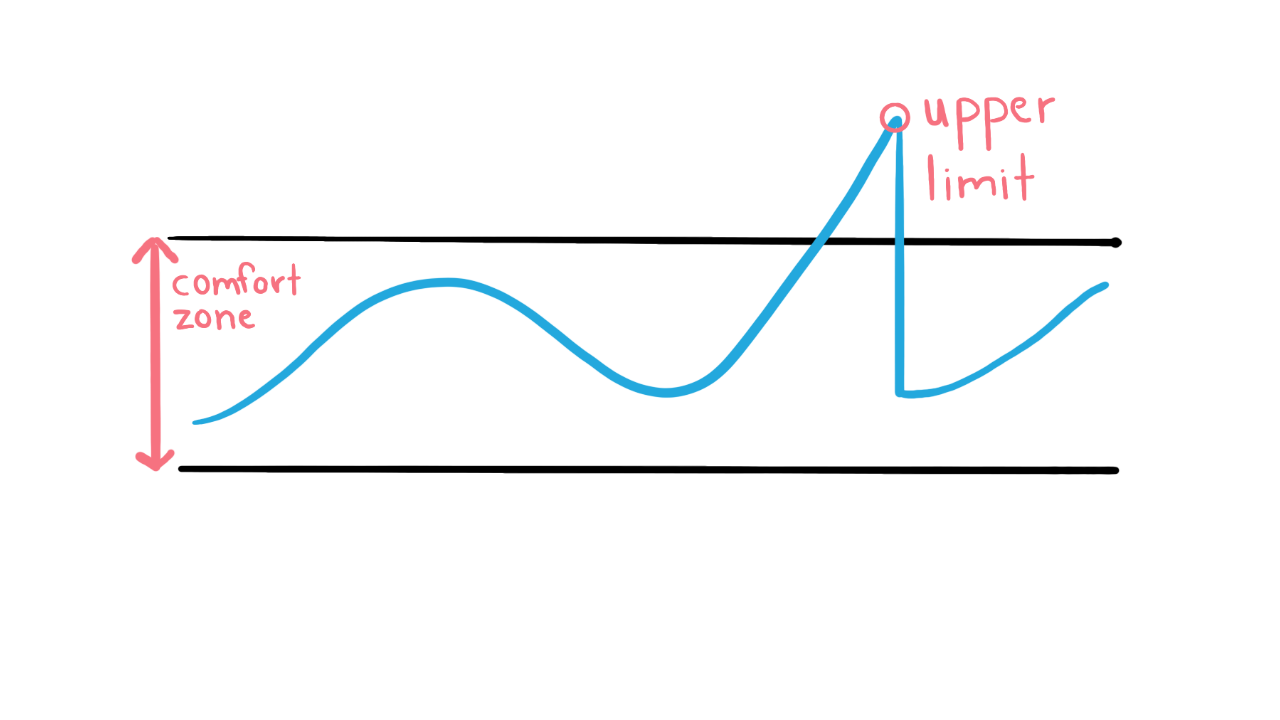You’re Upper Limiting (and You Don't Even Know It)
May 10, 2023
You may not see it. You may not be aware of it. You may not even have a name for it.
But chances are, you have experienced the upper limits problem numerous times.
It’s a term coined by psychologist Gay Hendricks in The Big Leap. The upper limits problem is a paradoxical pattern: when we start to feel good inside, we unconsciously sabotage ourselves so we can go back to feeling bad again.
Upper limits can be difficult to see in action because they run counter to our ordinary logic about life. We think that feeling bad – pain, tension, anxiety, and conflict – is uncomfortable. We think that feeling joy and deep connection is comfortable.
But the opposite is often true. Our nervous system is used to hanging out in an ordinary state of feeling bad. It’s not used to feeling amazing, open, and totally in sync with our partner.
This is why after feeling great for a while, we may feel a subconscious urge to go back to feeling bad. We’re not doing this because we’re crazy. We’re mostly not even aware that it’s happening. We’re just allowing the gravitational pull of our ordinary habits to run the show.
Last year, Will Smith demonstrated the problem of upper limits in epic fashion. He walked into the 2022 Oscars heavily favored to win the Best Actor Award. This night was going to be the greatest night of his life.
What happened? He upper limited. Just minutes before his big moment, he lost it, walking up on stage in the middle of the show and slapping comedian Chris Rock. This unconscious act of sabotage ensured that no one watching that evening would remember his crowning achievement as an actor. All they would remember was the slap.
Upper limits can also arise in relationships. Just when things get good, just when you feel connected, upper limits may start to emerge. You may unconsciously withdraw or pick a fight with your partner over something trivial, all so you can go back to that default state of feeling frustration and resentment.
How can you overcome upper limits?
Tools
1. Awareness.
When these forces arise in the shadows of awareness, they run the show. When we can see them, however, we now have the freedom to interrupt this momentum of self-sabotage.
In our experience, it’s often not enough just to notice the upper limit. We find it useful to call them out, saying, "I feel like I am upper limiting right now." Or, ideally catching it right before it happens with, “This feels great… I worry I’m about to upper limit.”
But how do you know when you’ve encountered an upper limit? Here are some key indicators to watch out for:
- You start thinking, "This feels too good to be true."
- Your mind begins running worst case scenarios of how it's all going to go away.
- You start experiencing body problems (back aches, migraines, digestive issues, etc.)
- You feel the urge to start an argument with your partner
- You start experiencing compulsions (to screens, substances, food, etc.)
2. Give yourself space to settle.
The key to solving the upper limits problem is learning how to get used to these states. The method for doing this is similar to the method you might use for high elevation mountain climbing.
You can't just race to the top of the mountain and expect to feel great. Your mind, body, and nervous system need time to acclimatize to each new elevated state along the way.
In your relationships, this might look like taking a moment to relax together when you notice you are experiencing new and deeper levels of connection. In your career, this might look like taking a moment to pause and get re-grounded when you have a big win.
Go for a walk. Lie in the grass. Take a nap. Give your nervous system the opportunity to acclimatize to this new and unfamiliar state.
Or, do something mundane. Check your email. Chop vegetables for dinner. Pull some weeds in the garden.
3. Remind yourself, "It can be this good."
Many of us have experienced so much trauma and emotional upheaval in life that we’re wired to distrust the experience of happiness, ease, connection, and contentment.
So it can be helpful in these moments, when you feel an upper limit approaching, to offer yourself (and your partner) a quick reminder: “It can be this good.”
This simple phrase can help you integrate feeling good into your experience of “normal” and keep you from unconsciously taking the habitual, self-sabotaging, path of the upper limit.
Want more of these life tools delivered to your inbox?
Sign up for the Klemp Insights Newsletter.
